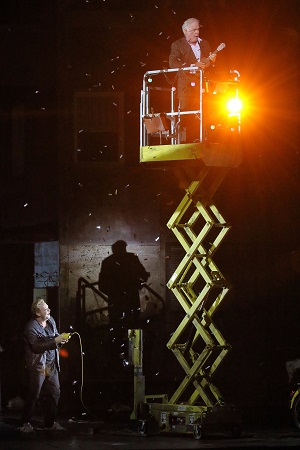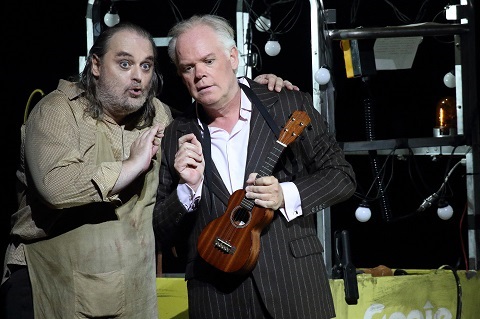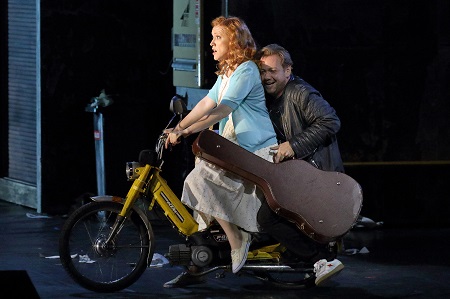01 Aug 2019
Die Meistersinger von Nürnberg in Munich
‘Es klang so neu und war doch ein bißchen alt’?

‘Es klang so neu und war doch ein bißchen alt’?
A little more than three years after first seeing David Bösch’s (then new) production of Die Meistersinger von Nürnberg, I looked forward to making its reacquaintance. It struck me then as being, alongside Stefan Herheim’s staging (seen in both Salzburg and Paris ), one of the most significant additions to the repertory. There has not, frankly, been much in the way of competition, offerings from Barrie Kosky and Andrea Moses in particular having proved well-nigh disastrous. How did Bösch’s staging measure up now? In some ways, well. It is certainly more coherent than either of the last too named. However, a good deal of what had made it distinctive, and had decided me to include it in this essay , had disappeared, presumably a casualty of the lack of rehearsal for a brief festival revival. Two at least of its most distinguishing characteristics, the violence at the heart of a reconstructed, provincial ‘community’, and a welcome feminist conception of Eva, had respectively been toned down (more likely, perhaps, unknowingly omitted) and jettisoned. A great pity, that, though perhaps not unlikely in the circumstances: a reminder, at least, that what we see in June and July is not always so very close to what was originally envisaged (and seen).
I shall try, though, not to dwell unduly on what might have been, on what had been: anyone interested in the 2016 first performances, including Jonas Kaufmann, may consult the initial review . The importance of (multi-)media in transmission of music, art more generally, and indeed life, such as it is, more generally, continues to register, for instance in video footage of plans, instructions, flowcharts, and sketches: there is a thin line, perhaps, between the nerd and the pedant. Press coverage of the mastersong competition flicks through, also on video, when the masters first enter, an important point the centenary 1868-1968 (the first year, of course, the work’s premiere, the second year not an unimportant year in the history of the Left), in which Veit Pogner had claimed the prize. That generation has a great deal to answer for, many of us would argue; at least we were spared the sight of Antony Charles Lynton Blair et al. strutting their wares ‘just more one time’. At any rate, this contest for a bartered bride, as much sport as art, and heavily sponsored by ‘Meister Bräu’’, sums things up nicely. Sport, of course, always gets off lightly, entwining nationalism (and/or localism) and toxic masculinity, as it does. No one dare accuse it, though, given the media interests at stake. (Consider British liberals’ obsession with the appalling 2012 Olympics.) Contrast that with the laudable attempts at self-criticism of most important artistic production since the Second World War. That contrast certainly seems implicit here, although the shock violence initially administered by Beckmesser as Marker to Walther now seems ‘mere’ entertainment: a flashing of lights rather than electric shock. Perhaps, though, as everything becomes more mediated, as Trump, Johnson, and other fascists star in their own game show, impervious to political criticism and activity, there is something to be said for such a degeneration too.

The moment of revolt - or is it further repression - comes through more fitfully in the second act than previously. Can one make a Marcusian case for the apprentices’ thuggery? Probably. Should one? Difficult to say. (One might say the same for Andreas Baader, after all, or the original, far more lethal, RAF.) But the chemistry between Sachs and Eva, the plausibility of their romance, has struck earlier on a very different note. What often seems dramaturgically unconvincing, even odd, here seems quite natural, for want of a better word. Whether that were the case in 2016, I cannot remember, although the artists, Wolfgang Koch and Sara Jakubiak, were the same. Their performances all round were outstanding. If the extremely powerful moment of Eva’s rejection - of the contest - in the third act now seemed to be missing, Jakubiak offered intelligent, vocally alluring singing, as well as accomplished acting. So too did Koch, of course, with a wisdom born of experience not only as Sachs but in many other roles.
Let us return, however, to the production, to the third act. Sachs’s neon-lit van having lost two of its letters, now sighs, in Schopenhauerian style, ‘ACH’. More might have been made of that implication, especially in light of loss of the provincial violence that initially made this act so threatening, so disconcerting. There remain hints, perhaps most notably in the apprentices’ behaviour towards David, homophobic bullying still, I think, implicit. But they are only hints, and would perhaps mostly be noticed by those who had seen the production before. Beckmesser’s return at the very close, to shoot himself, makes far less sense in the absence of such build-up. A pity, as I said, although perhaps there is something to be salvaged in reflection upon continuing degeneration into entertainment.

Musically, standards remained high: very high indeed in the case of Kirill Petrenko, the orchestra, and chorus. Of Wagner’s works, this seems very much Petrenko’s best, at least in my experience. Formidable technical challenges - simply marshalling those forces, in a far from simple staging - never seemed to register, however great the art in concealing that art (a Meistersinger virtue in itself). Wagner’s score flowed with all the inevitability of a mighty river. That is never, though, at the expense of detail, overt contrapuntal (and other) virtuosity in which the composer sometimes revels portrayed lovingly, comprehendingly, without degenerating into mere virtuosity itself. It was, moreover, not only in the counterpoint and chorales that Wagner’s Bachian debt was repaid. Wagner’s writing for oboes in particular, played as superlatively as it was here, gave pause to all manner of thoughts concerning connection with Bach’s sacred music too. (Now might we hear a St Matthew Passion or B minor Mass from Petrenko? Even some of the cantatas? Too much to hope? If so, it is surely a victimless crime.)

Kaufmann had withdrawn earlier in the week, replaced at very short notice as Walther by Daniel Kirch. There was considerable promise in his performance, although he tired towards the end. At his best in the second act, Kirch showed himself capable of a detailed, variegated performance, both verbally and musically. Earlier on, perhaps still finding his way around the Nationaltheater, he had a tendency to force his voice somewhat, almost as if a Siegfried. There remained, though, much to admire. Martin Gantner’s Beckmesser was first-rate: a sung Malvolio of the highest quality. Allan Clayton’s David proved equally detailed and finely sung, well matched to Okka von der Damerau’s spirited Magdalena. Christof Fischesser made for an uncommonly youthful, virile Pogner, and Milan Siljanov’s Night Watchman suggested a singer from whom we shall be hearing much more soon. More than enough, then, to be going on with until the full revival Bösch’s production unquestionably merits.
Mark Berry
Wagner: Die Meistersinger von Nürnberg
Walther von Stolzing - Daniel Kirch, Eva - Sara Jakubiak, Magdalene - Okka von der Damerau, David - Allan Clayton, Hans Sachs - Wolfgang Koch, Sixtus Beckmesser - Martin Gantner, Veit Pogner - Christof Fischesser, Fritz Kothner - Michael Kupfer-Radecky, Kunz Vogelgesang - Kevin Conners, Konrad Nachtigall - Christian Rieger, Ulrich Eißlinger - Dean Power, Hermann Ortel - Levente Páll, Balthasar Zorn - Ulrich Reß, Augustin Moser - Thorsten Scharnke, Hans Foltz - Roman Astakhov, Hans Schwarz - Peter Lobert, Night Watchman - Milan Siljanov; Director - David Bösch, Conductor - Kirill Petrenko, Set designs - Patrick Bannwart, Costumes - Meentje Nielsen, Video - Falko Herold, Lighting - Michael Bauer, Dramaturgy - Rainer Karlitschek, Revival director - Theresa Schlichtherle, Chorus, Extra Chorus, Orchestra of the Bavarian State Opera.
Nationaltheater, Munich; 27th July 2019.